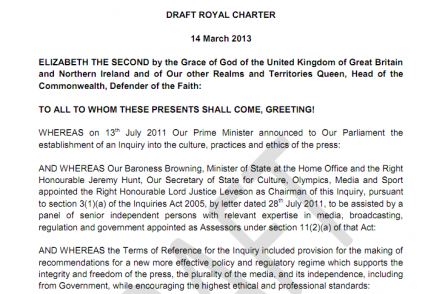
The Conservatives have published a beefed-up Royal Charter press regulation plan which appears to make major concessions to campaigners.
But Labour and the Lib Dems still say it does not go far enough and insist that they want legislation.
Under the new charter the press industry no longer has a guaranteed representative on the appointments committee for the new press regulation Recognition Panel.
This appears to tackle a major criticism that the panel was not independent of the press, as called for by Lord Justice Leveson.
In another departure from version one, the new plan calls for the creation of by the regulator of a “whistleblowing hotline for those who feel that they are being asked to do things which are contrary to the standards code” .
Addressing what was thought to be another major sticking-point in negotiations, the new Royal Charter says that the new press regulator must have the power to specify where corrections and clarifications appear, “in the event of no agreement between a complainant and a subscriber”.
The Royal Charter also sets out the terms of a low-cost arbitration service for claims against publishers. In another amendment, the new version states that it should be free, rather than inexpensive, for claimants to use.
On Monday, the House of Commons will discuss the Royal Charter and also debate a legislative amendment which will give legal backing to the arbitration arm by saying that publishers who do not join the new regulator will leave themselves open to the threat of exemplary damages being awarded against them in civil claims.
Labour and the Lib Dems have said that the Tory plan does not go far enough and insisted that it be backed up by legislation, and they have published their own Royal Charter.

According to Labour leader Ed Miliband the Labour and Lib Deb Royal Charter differs from the Tory one in three main ways:
"First, this must be an enduring settlement. That means underpinning the charter with the minimum amount of legislation needed to guarantee its success and independence over time. We want to ensure that future governments cannot tamper with the new system, either by watering it down under pressure from the newspapers, or introducing new draconian measures which would threaten the freedom of the press.
“Second, the regulator should be properly independent of the press, so we would remove the industry’s power of veto over appointments.
“Finally, when wrong is done, the regulator should be able to investigate, as well as ensure a proper and prominent apology is made."
Press Gazette has asked the Labour Party for clarification on the last two points.
Read the Labour and Liberal Democrat Royal Charter here
Read the Conservative Royal Charter plan
Kirsty Hughes, chief executive of the Index on Censorship, said: “We have always said it’s a fundamental principle that MPs should not vote on this.
“We need a tougher regime with a standards remit but no one expects that to be perfect. I cannot see how Clegg, Miliband and Hacked Off think legislation will ensure good behaviour.”
However, she also said that David Cameron’s Royal Charter amounted to legislation by the back door.
“It may not be classed as statutory but it is political; it’s Cameron’s attempt at a compromise but we would have preferred that another way without politicians could have been found.”
Email pged@pressgazette.co.uk to point out mistakes, provide story tips or send in a letter for publication on our "Letters Page" blog







